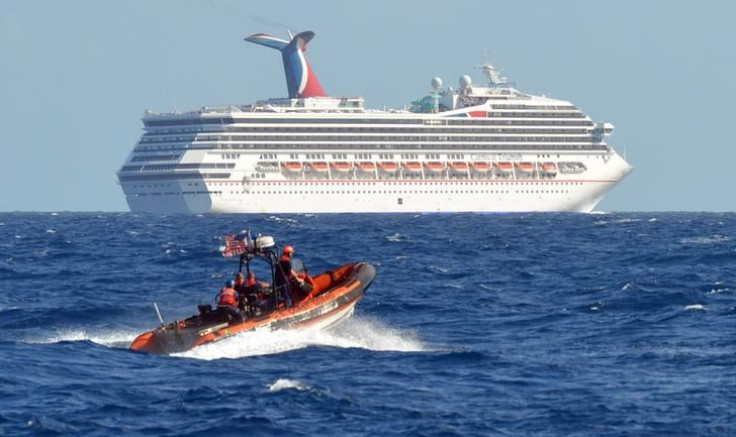Carnival Triumph Cruise Ship Adrift Again Amid Row Over Coast Guard Costs

The curse of beleaguered Carnival Corp. continued Wednesday after Carnival Triumph broke free from its wet dock in Alabama and went adrift for the second time in two months.
“Due to strong winds that reached speeds exceeding 70 miles per hour during a severe storm in Mobile, Ala., Carnival Triumph, which was in wet dock at a Mobile shipyard, broke away from its moorings,” the company said Wednesday evening. “The ship drifted and is now secure. It is expected to soon be moved to the Mobile Cruise Terminal. There are a number of tug boats on site, as well as the U.S. Coast Guard and Mobile authorities.”
The disabled cruise ship drifted into a nearby cargo vessel at around 2 p.m., and pictures from a local ABC station show a large gash in Triumph’s stern, though Carnival has declined to comment on any damages.
Steve Huffman of the Mobile Fire and Rescue Department said the strong winds at the BAE Shipyard also blew a guard shack two docks away from Triumph into the river with two workers inside.
“One was recovered and taken to a hospital with mild hypothermia,” he said. “The other is missing. Currently Mobile PD, U.S. Coast Guard and Mobile Country Sheriffs Flotilla are searching for the missing man.”
The Department said in a tweet earlier in the day that the cruise ship “had nothing to do with [the guard shack] incident.”
Carnival Corp., the world’s largest cruise company, announced at an annual cruise industry conference in Miami last month that it was in the midst of a “comprehensive review” of its 23 ships after the Feb. 10 fire on 14-story Carnival Triumph left more than 4,000 passengers and crew stranded in the Gulf of Mexico for days as the vessel was towed back to the U.S. mainland. Food was scarce, cruisers baked in the sun with no air conditioning and many reported human waste running down the hallways.
Passengers on the Triumph filed a class-action lawsuit against the company in the aftermath, and the ship has been under repair at the Alabama shipyard ever since.
The company canceled 12 sailings scheduled for the spring due to the repairs, and it remains unclear if Wednesday’s incident will further delay the ship’s return, scheduled for June 3.
Assistance from the U.S. Coast Guard Wednesday is likely to be met with heightened criticism from members of Congress like Sen. Jay Rockefeller, D-WV. He penned a letter to Carnival CEO Micky Arison on March 14 alleging that the Coast Guard had responded to 90 “serious events” involving Carnival ships over the past five years. The incidents on Carnival Triumph and Carnival Splendor alone, he added, cost the Coast Guard and Navy $4.2 million.
“These costs must ultimately be borne by federal taxpayers,” Senator Rockefeller wrote. “Given that you reportedly pay little or nothing in federal taxes, do you intend to reimburse the Coast Guard and Navy for the cost of responding to either the Carnival Splendor marine casualty or the Carnival Triumph marine casualty?”
Letters from Carnival Corp. to Senator Rockefeller dated March 29 (but made public by Seatrade Insider this week) reveal that the cruise line has absolutely no intention of reimbursing the Coast Guard and Navy for its assistance, or any future problem where they may require help from the U.S. government.
“Carnival’s policy is to honor maritime tradition that holds that the duty to render assistance at sea to those in need is a universal obligation of the entire maritime community,” James Hunn, Carnival’s senior vice president of corporate maritime policy, wrote. “We frequently render assistance at sea at our own cost, on our own initiative or at the direct request of the U.S. Coast Guard and other authorities.”
Hunn said that only seven of the 90 events Rockefeller cited in his letter amounted to “serious maritime incidents” under the Code of Federal Regulations, and added that the cruise industry generated more than $40 billion in economic impact and 350,000 jobs in the U.S. during 2011.
“The cruise industry’s contribution to the American economy in the form of various taxes and job creating assists in payment of the federal services that are provided,” Hunn said.
© Copyright IBTimes 2024. All rights reserved.












